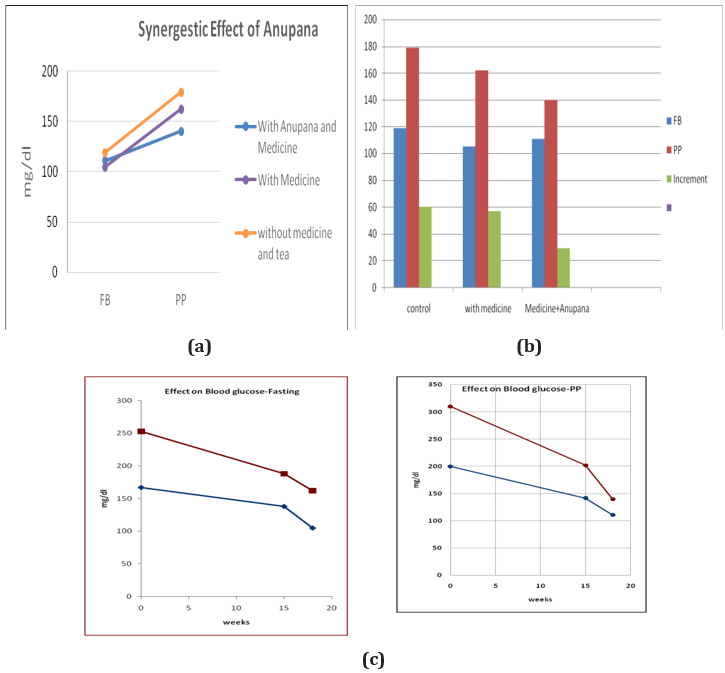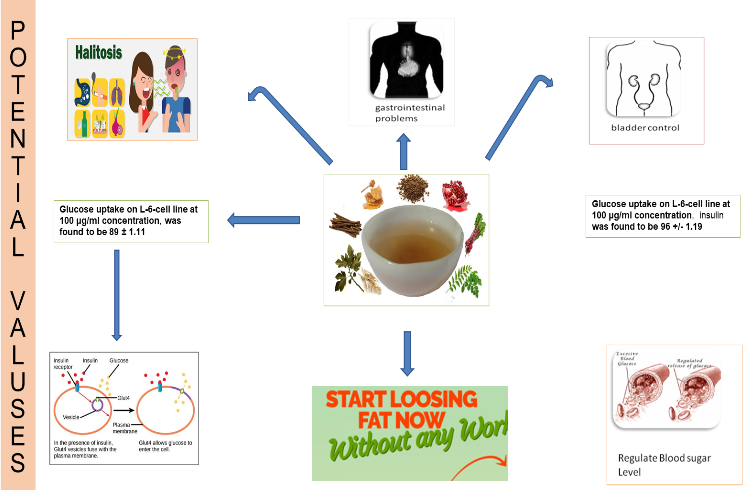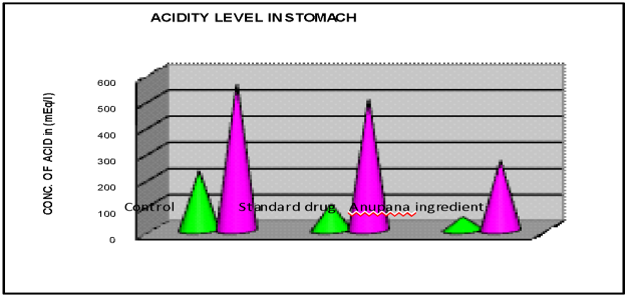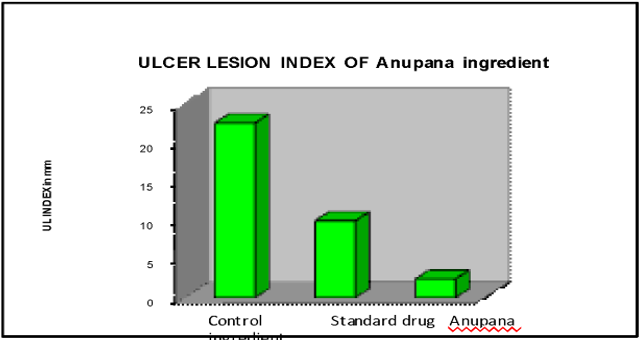Case Report
Volume 5 Issue 1 - 2023
Symbiotic Effect of Herbal Blend on Lifestyle Conditions and Diseases
1Chairman, Asthagiri Herbal Research Foundation, Perungudi
2Senior Research Scientist, Asthagiri Herbal Research Foundation, Perungudi
2Senior Research Scientist, Asthagiri Herbal Research Foundation, Perungudi
*Corresponding Author: Narasimhan Srinivasan, Chairman, Asthagiri Herbal Research Foundation, Perungudi.
Received: January 25, 2023; Published: February 10, 2023
Abstract
Objective: To analyze the potential of developed symbiotic herbal blend on different lifestyle diseases.
Methods: A proprietary unique blend of two complimentary herbs were combined and enhanced with natural flavor. The bioenhancerayurvedic concepts were used to develop the formulation. A case study was conducted to find the effects on diabetes, acidity and obesity.
Results: The formulated herbal soup mix in the brand name of Anupana®acts as an symbiotic supplements and shows significant reduction in Weight, Blood glucose level, acid in stomach, Blood pressure etc.,
Conclusion: An ayurvedic concept called anupana describes the application of adjuvents in enhancing the efficacy of drugs. This is being explored with our findings to make nutritional supplements. Anupana® symbotic herbal soup shows positive results in different lifestyle conditions such as Diabetes, Hypertension, Obesity, etc.,
Introduction
Lifestyle Diseases or Non Communicable Diseases are a major public health problem globally. In 2018, World Health Organization (WHO) estimated on NCDs shows that 71% of all deaths (41 million) were attributed globally. The four groups of diseases were responsible for over 80% death all over the world. The conditions such as Cardiovascular diseases account for most NCD deaths, or 17.9 million people annually, followed by cancers (9.0 million), respiratory diseases (3.9 million), and diabetes (1.6 million) (Balwan et al 2021). The country has been undergoing a rapid transition in health over the past several decades – a shift from infectious diseases to non-communicable diseases (NCDs) (Mathur and Mascarenhas, 2019). Lifestyle diseases are ailments that are primarily based on the day to day habits of people. Habits that detract people from activity and push them towards a sedentary routine can cause a number of health issues that can lead to chronic non-communicable diseases that can have near life-threatening consequences (Tabish, 2017). These diseases can be under control when the diet is modified. Diet modification can also be included by adding some herbs and herbal blends that have direct impact on these diseases. Herbal blends should be under correct proportion to treat or cure the disease. The proactive approaches for health care is Health promotion, disease prevention and chronic disease management and it emphasis prevention at different points along the health care extent. A step in the prevention of lifestyle diseases herbal combination was studied. Highly effective, safe and convenient food products were developed and studied for its symbiotic effect in various lifestyle related disease conditions.
Methods
A proprietary unique blend of two complimentary herbs were combined and enhanced with natural flavor. Symbiotic effect was studied by screening the herbal blend and analyzing its effects. The Bioenhancerayurvedic concepts were used to develop the formulation.
Screening and analysis of Symbotic herbal soup
The Anupana® symbotic herbal soup were screening for its Active constituents, Nutritive value, Invitro cytotoxicity study, Clinical study –symptomatic
The Anupana® symbotic herbal soup were screening for its Active constituents, Nutritive value, Invitro cytotoxicity study, Clinical study –symptomatic
Active constituents in Anupuna® herbal soup
The chemical constituents present in the Anupuna® herbal soup were xanthones, catechins, flavonoids, small peptides. The secondary metabolites identified in the Anupuna® herbal soup product was hesperidin, epicatechin have shown superior activity against SARS COV2 proteins and thus provides a useful preventive food supplement.
The chemical constituents present in the Anupuna® herbal soup were xanthones, catechins, flavonoids, small peptides. The secondary metabolites identified in the Anupuna® herbal soup product was hesperidin, epicatechin have shown superior activity against SARS COV2 proteins and thus provides a useful preventive food supplement.
Nutritive Value
The nutritional evaluation was also carried out for 100 g of Anupuna® herbal soup. The energy value (kcal/kg) were found to be 2 kcal/ serving, Carbohydrate (12 per cent), Protein (12 per cent), Fat (2 per cent), Fiber (1 per cent). The micronutrients for 1 kg of Anupuna® herbal soup were analysed and found Iron (387.5 mg/kg), Magnesium (3405 mg/kg), Potassium (5900 mg/kg), and Manganese (134 mg/kg).
The nutritional evaluation was also carried out for 100 g of Anupuna® herbal soup. The energy value (kcal/kg) were found to be 2 kcal/ serving, Carbohydrate (12 per cent), Protein (12 per cent), Fat (2 per cent), Fiber (1 per cent). The micronutrients for 1 kg of Anupuna® herbal soup were analysed and found Iron (387.5 mg/kg), Magnesium (3405 mg/kg), Potassium (5900 mg/kg), and Manganese (134 mg/kg).
In- Vitro cytotoxicity study
The cytotoxicity studies were carried out to check the toxicity of the Anupuna® herbal soup extract in vitro against L-6 and MCF-7 (breast cancer cell line). The 50 per cent cytotoxic concentration/ Inhibitory concentration (CTC50/ IC50), was determined by the standard MTT assay.
The cytotoxicity studies were carried out to check the toxicity of the Anupuna® herbal soup extract in vitro against L-6 and MCF-7 (breast cancer cell line). The 50 per cent cytotoxic concentration/ Inhibitory concentration (CTC50/ IC50), was determined by the standard MTT assay.
Determination of mitochondrial synthesis by MTT assay
| No. | Sample | L-6 (IC50 μg/ml) | MCF-7IC50 μg/ml |
| 1. | Simha’s Anupana | 324.98 | 22.60 |
- The Anupuna® herbal soup showed notable activity at the lowest concentration against breast cancer cell line and did not kill the skeletal muscle cells at the higher concentration.
- It is also interesting to note that Anupuna® herbal soup also showed significant cancer cell killing against breast cancer cell line.
Safety Data
According to the GHS category 5 LD50> 2000 mg/kg as per OECD guideline no.423 study were conducted under JSS College of Pharmacy, Ottacamund, Animal study (AOT/TCM/O1/15) to assess the safety of the herbal blend and confirmed its safety.
According to the GHS category 5 LD50> 2000 mg/kg as per OECD guideline no.423 study were conducted under JSS College of Pharmacy, Ottacamund, Animal study (AOT/TCM/O1/15) to assess the safety of the herbal blend and confirmed its safety.
Benefits of Anupuna® herbal soup
Clinical study – symptomatic
The Anupuna® herbal soup was developed for different heath condition. The herbal soup is effective for weight loss, acidity, diabetes, hypercholestermia, metabolic syndrome, immunity booster etc., Symptomic pilot study were done on 30 numbers of people by the supplementation of Anupuna® herbal soup.
The Anupuna® herbal soup was developed for different heath condition. The herbal soup is effective for weight loss, acidity, diabetes, hypercholestermia, metabolic syndrome, immunity booster etc., Symptomic pilot study were done on 30 numbers of people by the supplementation of Anupuna® herbal soup.
Anupuna® herbal soup on diabetes
A Study was conducted to compare the effect of Anupuna® herbal soup with metaformin. The Anupuna® herbal soup synergestic effects were studied. The subjects were divided into three groups and supplemented Group 1: Herbal soup with Medicine Group 2: Medicine Group 3: Herbal soup without medicine.
A Study was conducted to compare the effect of Anupuna® herbal soup with metaformin. The Anupuna® herbal soup synergestic effects were studied. The subjects were divided into three groups and supplemented Group 1: Herbal soup with Medicine Group 2: Medicine Group 3: Herbal soup without medicine.

Figure 3a: Synergestic Effect of Anupuna® Symbiotic herbal soup. 3b: Graphical representation of fasting and postprandial blood glucose level. 3c: Anupuna® Symbiotic herbal soup effect on HbA1c.
The results reveals that Group 1 and Group 3 with and without medication along with herbal soup shows significant reduction compare to the group with only medication (metformin). The primary finding in this study was there is a significance reduction in Fasting Blood Glucose and Post partial blood glucose levels due to Anupuna® Symbiotic herbal soup also work as a dietary supplement which increases the insulin output, thereby reducing the glucose level in the diabetic patients. There is a significant decrease in HbA1c level in the Anupuna® Symbiotic herbal soup supplemented subjects. It also acts as a catalyst for better absorption of medicines. Treatment with the symbiotic herbal soup is well tolerated without any side effects. Medicinal use of herbal medicine in the treatment and prevention of diseases including diabetes has a long history compared to conventional medicine (Choudhury et al 2018).
Anupuna® Symbiotic herbal soup on acidity
The symbiotic herbal soup is effective on the acidity level in the stomach. Anupuna® Symbiotic herbal soup were supplemented to ulcer subjects shows less concentration of acid in stomach compares to the standardized drugs prescribed.
The symbiotic herbal soup is effective on the acidity level in the stomach. Anupuna® Symbiotic herbal soup were supplemented to ulcer subjects shows less concentration of acid in stomach compares to the standardized drugs prescribed.
The Anupuna® Symbiotic herbal soup shows significant reduction in the acid secretion of stomach and less ulcer lesion index score were also found. The Anupuna® Symbiotic herbal soup is a unique blend of herbs and spices which produces alkaline extract, quenches acidity and maintains healthy pH level which is the main cause for stress, anxiety and metabolic disorders. The multiple mechanisms of action of medicinal plants in GERD other than anti-secretory properties appear to provide more efficient treatment and helped to manage the histopathological changes associated with this disorder (Salehi et al 2016).
Anupuna® Symbiotic herbal soup on obesity The Anupuna® Symbiotic herbal soup shows significant decrease in the weight over a period of time. Monthly minimum 1-2 kg healthy weight loss was found. Its works as a bio-enhancer formula and enhance the absorption in the intestine. Anupuna® Symbiotic herbal soup helps in weight loss by several mechanisms of action, including increasing energy expenditure, increasing satiety, blocking dietary fat absorption, modulating carbohydrate metabolism, increasing water elimination and reduce stress.
Conclusion
Anupuna® Symbiotic herbal soup is developed based on ayurvedic concept of “Bio-enhancers”. Just added into your existing routine, the chemistry improves your life style. The product is a unique blend of natural herbs. Can be had any time of the day, compatible with every foods. Proven to act synergistically with medicines. An ayurvedic concept called anupana describes the application of adjuvents in enhancing the efficacy of drugs. This is being explored with our findings to make nutritional supplements
References
- Mathur, P and Mascarenhas, L (2019). “LIFESTYLE DISEASES: Keeping fit for a better tomorrow”. Indian Journal of medical Research. 49(Suppl 1): S129–S135.
- Salehi, M., Borzi, K.H., Karimi, M., Rahimi, R (2017). “Medicinal Plants for Management of Gastroesophageal Reflux Disease: A Review of Animal and Human Studies”. Journal of Alternative Complementary Medicine, 23 (2): 82-95.
- Choudhury, A.I., Pandey, A, M., Hua, A, C, K., Mun, A, C, S., Jing, J.K., Kong, L., Ern, L, Y., Ashraf, A.N., Kit, S.W., Yee, T.S., Pichika, M.R., Gorain, B and Kesharwania, C, K (2017). "An update on natural compounds in the remedy of diabetes mellitus: A systematic review". Journal of Traditional complementary medicine, 8 (3): 361-376.
- Balwan, Wahied & Kour, Sachdeep. (2021). Lifestyle Diseases: The Link between Modern Lifestyle and Threat to Public Health. Saudi Journal of Medical and Pharmaceutical Sciences. 7: 179-184.
- Tabish SA (2017). “Lifestyle Diseases: Consequences, Characteristics, Causes and Control”. Journal of Cardiology Current Research, 9(3): 00326.
Citation: Narasimhan Srinivasan and Sasikala sekar. (2023). Symbiotic Effect of Herbal Blend on Lifestyle Conditions and Diseases. Archives of Nutrition and Public Health 5(1). DOI: 10.5281/zenodo.7748244
Copyright: © 2023 Narasimhan Srinivasan. This is an open-access article distributed under the terms of the Creative Commons Attribution License, which permits unrestricted use, distribution, and reproduction in any medium, provided the original author and source are credited.




